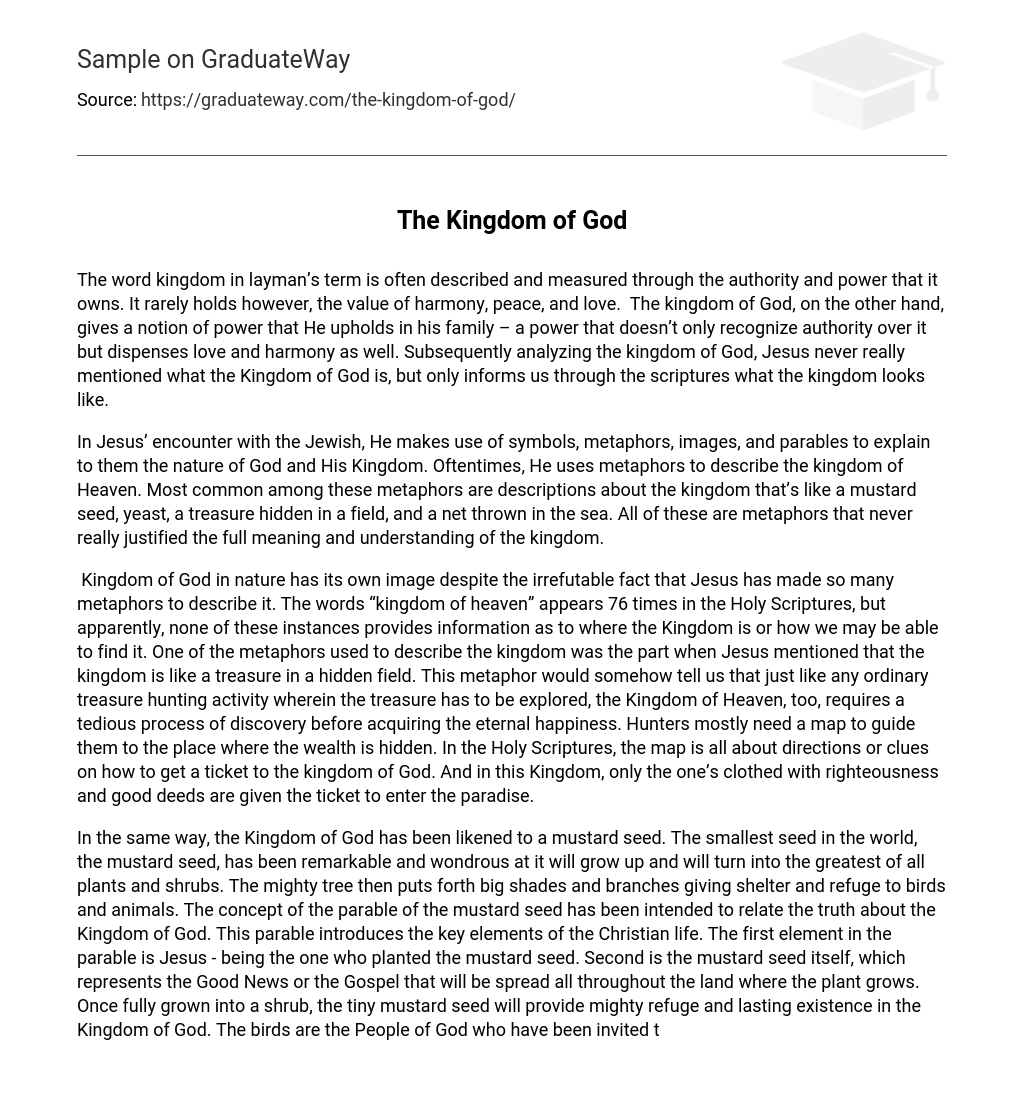The word kingdom in layman’s term is often described and measured through the authority and power that it owns. It rarely holds however, the value of harmony, peace, and love. The kingdom of God, on the other hand, gives a notion of power that He upholds in his family – a power that doesn’t only recognize authority over it but dispenses love and harmony as well. Subsequently analyzing the kingdom of God, Jesus never really mentioned what the Kingdom of God is, but only informs us through the scriptures what the kingdom looks like.
In Jesus’ encounter with the Jewish, He makes use of symbols, metaphors, images, and parables to explain to them the nature of God and His Kingdom. Oftentimes, He uses metaphors to describe the kingdom of Heaven. Most common among these metaphors are descriptions about the kingdom that’s like a mustard seed, yeast, a treasure hidden in a field, and a net thrown in the sea. All of these are metaphors that never really justified the full meaning and understanding of the kingdom.
Kingdom of God in nature has its own image despite the irrefutable fact that Jesus has made so many metaphors to describe it. The words “kingdom of heaven” appears 76 times in the Holy Scriptures, but apparently, none of these instances provides information as to where the Kingdom is or how we may be able to find it. One of the metaphors used to describe the kingdom was the part when Jesus mentioned that the kingdom is like a treasure in a hidden field. This metaphor would somehow tell us that just like any ordinary treasure hunting activity wherein the treasure has to be explored, the Kingdom of Heaven, too, requires a tedious process of discovery before acquiring the eternal happiness. Hunters mostly need a map to guide them to the place where the wealth is hidden. In the Holy Scriptures, the map is all about directions or clues on how to get a ticket to the kingdom of God. And in this Kingdom, only the one’s clothed with righteousness and good deeds are given the ticket to enter the paradise.
In the same way, the Kingdom of God has been likened to a mustard seed. The smallest seed in the world, the mustard seed, has been remarkable and wondrous at it will grow up and will turn into the greatest of all plants and shrubs. The mighty tree then puts forth big shades and branches giving shelter and refuge to birds and animals. The concept of the parable of the mustard seed has been intended to relate the truth about the Kingdom of God. This parable introduces the key elements of the Christian life. The first element in the parable is Jesus – being the one who planted the mustard seed. Second is the mustard seed itself, which represents the Good News or the Gospel that will be spread all throughout the land where the plant grows. Once fully grown into a shrub, the tiny mustard seed will provide mighty refuge and lasting existence in the Kingdom of God. The birds are the People of God who have been invited to join the covenant and experience the greatness of the kingdom. The People of God will find sanctuary and rest under the branches of the great tree.
References
AllAboutJesus.org (n.d.). Parable of the Mustard Seed. Retrieved September 20, 2008, from http://www.allaboutjesuschrist.org/parable-of-the-mustard-seed-faq.htm
Worldwide Church of God. (n.d.). The Present and Future Kingdom of God. Retrieved September 20, 2008, from http://www.wcg.org/lit/gospel/kingdom.htm
Religion-Online.org (n.d.). Kingdom of God and Ecology: A Parabolic Perspective. Retrieved September 20, 2008, from http://www.religion-online.org/showarticle.asp?title=2453





